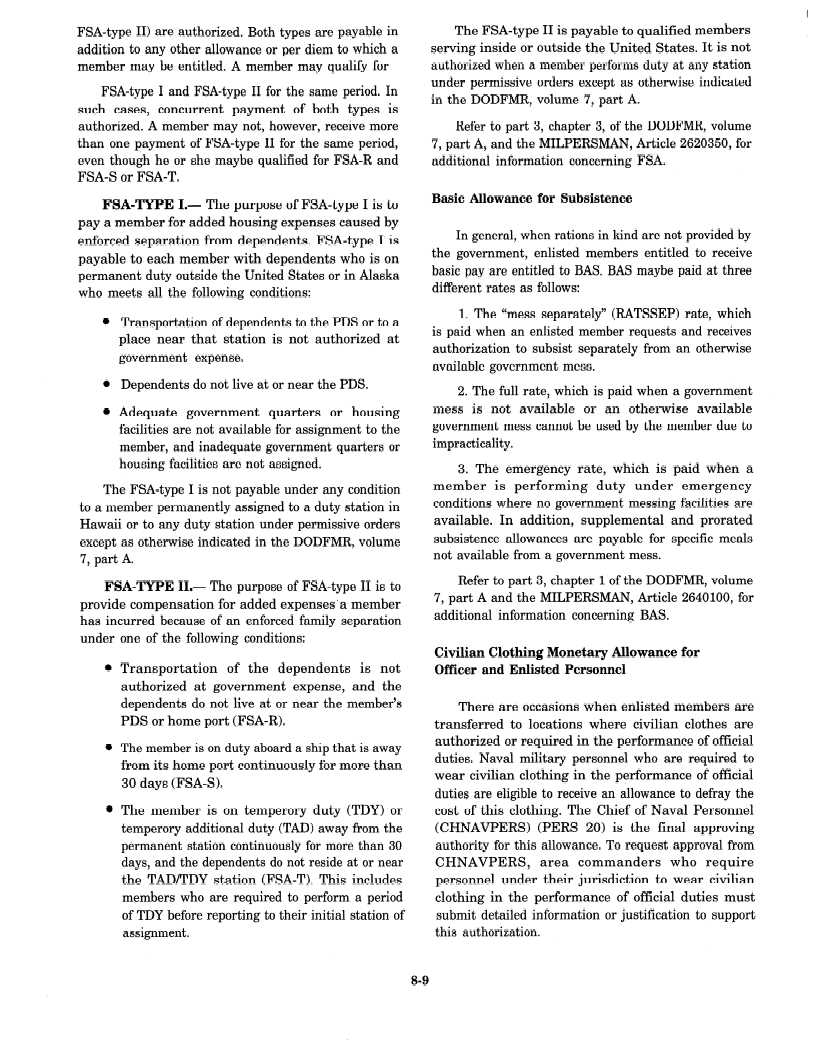| |
FSA-type II) are authorized.
Both types are payable in
addition
to any other allowance or per diem to which a
member may be entitled.
A member may qualify
for
FSA-type I and FSA-type II for the same period. In
such
cases, concurrent
payment
of both
types
is
authorized.
A member may not, however, receive more
than one payment of FSA-type II for the same period,
even though he or she maybe qualified
for FSA-R and
FSA-S or FSA-T.
FSA-TYPE
I.-
The purpose of FSA-type
I is to
pay a member for added housing
expenses caused by
enforced
separation
from dependents.
FSA-type
1. is
payable
to each member with
dependents
who is on
permanent
duty outside the United States or in Alaska
who meets all the following
conditions:
Transportation
of dependents to the PDS or to a
place near
government
that
station
is not authorized
at
expense.
Dependents do not live at or near the PDS.
Adequate
government
quarters
or housing
facilities
are not available
for assignment to the
member, and inadequate government
housing facilities
are not assigned.
quarters or
The FSA-type I is not payable under any condition
to a member permanently
assigned to a duty station in
Hawaii
or to any duty station under permissive orders
except as otherwise indicated
in the DODFMR, volume
7, part A.
FSA-TYPE
II.-
The purpose of FSA-type II is to
provide
compensation
for added expenses ‘a member
has incurred
because of an enforced family
separation
under
0
one of the following
conditions:
Transportation
of the
dependents
is not
authorized
at government
expense,
and the
dependents do not live at or near the member’s
PDS or home port (FSA-R).
The member is on duty aboard a ship that is away
from its home port continuously
for more than
30 days (FSA-S).
The member
is on temperory
duty
(TDY)
or
temperory
additional
duty (TAD) away from the
permanent station continuously
for more than 30
days, and the dependents do not reside at or near
the TAD/TDY
station
(FSA-T).
This includes
members who are required
to perform a period
of TDY before reporting
to their initial
station of
assignment.
The FSA-type
II is payable to qualified
members
serving
inside or outside the United
States. It is not
authorized when a member performs duty at any station
under permissive
orders except as otherwise
indicated
in the DODFMR,
volume 7, part A.
Refer to part 3, chapter 3, of the DODFMR, volume
7, part A, and the MILPERSMAN,
Article
2620350, for
additional
information
concerning
FSA.
Basic Allowance
for Subsistence
In general, when rations in kind are not provided by
the government,
enlisted
members entitled
to receive
basic pay are entitled to BAS. BAS maybe paid at three
different
rates as follows:
1. The “mess separately” (RATSSEP) rate, which
is paid when an enlisted member requests and receives
authorization
to subsist separately
from an otherwise
available
government
mess.
2. The full rate, which is paid when a government
mess is not
available
or an otherwise
available
government mess cannot be used by the member due to
impracticality.
3. The emergency
rate,
which
is paid when
a
member
is performing
duty
under
emergency
conditions
where no government
messing facilities
are
available.
In addition,
supplemental
and prorated
subsistence allowances
are payable for specific meals
not available
from a government
mess.
Refer to part 3, chapter 1 of the DODFMR, volume
7, part A and the MILPERSMAN,
Article
2640100, for
additional
information
concerning
BAS.
Civilian
Clothing
Monetary
Allowance
for
Officer
and Enlisted
Personnel
There are occasions when enlisted
members are
transferred
to locations
where
civilian
clothes
are
authorized
or required
in the performance
of official
duties. Naval military
personnel
who are required
to
wear civilian
clothing
in the performance
of official
duties are eligible to receive an allowance to defray the
cost of this clothing.
The Chief of Naval
Personnel
(CHNAVPERS)
(PERS
20) is the final
approving
authority
for this allowance. To request approval from
CHNAVPERS,
area
commanders
who
require
personnel
under
their
jurisdiction
to wear
civilian
clothing
in the performance
of official
duties
must
submit detailed information
or justification
to support
this authorization.
8-9
|

